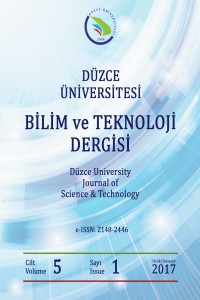Sıvı Kromatografisi Sıralı Kütle Spektroskopisi (LC-MS/MS) Tekniği İle Noskapin Ve İlgili Stres Bozunma Bileşiklerinin İncelenmesi Ve Tayini İçin Metot Optimizasyonu
Abstract
Keywords
References
- M.O. Abdalla, P. Karna, H.K. Sajja, H. Mao, C. Yates, T. Turner, R. Journal of Controlled Release 149(3) (2011) 314-322.
- J.W. Landen, V. Hau, M. Wang, T. Davis, B. Ciliax, B.H. Wainer, E.G. Van Meir, J.D. Glass, H.C. Joshi, D.R. Archer Clinical Cancer Research 10 (2004) 5187-5201.
- K. Ye, Y. Ke, N. Keshava, J. Shanks, J.A. Kapp, R.R. Tekmal, J. Petros, H.C. Joshi Proceedings of the National Academy of Sciences 95(4) (1998) 1601-1606.
- C. Sioka, A.P. Kyritsis Cancer Chemotherapy and Pharmacology 63(5) (2009) 761-767.
- S.B. Park, A.V. Krishnan, C.S. Lin, D. Goldstein, M. Friedlander, M.C. Kiernan Current medicinal chemistry 15(29) (2008) 3081-3094.
- Y. Ke, K. Ye, H.E. Grossniklaus, D.R. Archer, H.C. Joshi, J.A. Kapp Cancer Immunology Immunotherapy 49(4-5) (2000) 217-225.
- T. Jackson, M. Chougule, N. Ichite, R. Patlolla, M. Singh Cancer Chemotherapy and Pharmacology 63(1) (2008) 117-126.
- E. Bitoun, A. Micheloni, L. Lamant, C. Bonnart, A. Tartaglia-Polcini, C. Cobbold, T. Al Saati, F. Mariotti, J. Mazereeuw-Hautier, F. Boralevi, D. Hohl, J. Harper, C. Bodemer, M. D’Alessio, A. Hovnanian Human molecular genetics 12(19) (2003) 2417-2430.
- B. Dahlstrom, T. Mellstrand, C.G. Lofdahl, M. Johansson European journal of clinical pharmacology 22(6) (1982) 535-539.
- M.O. Karlsson, B. Dahlstrom, S.A. Eckernas, M. Johansson, A.T. Tufvesson Alm European journal of clinical pharmacology 39(3) (1990) 275–279.
- T. Gürkök, İ. Parmaksız, G. Boztepe, E. Kaymak Electronic Journal of BioTechnology 1(2) (2010) 31-45.
- Y. Arslan, D. Katar, F. Kayaçetin, İ. Subaşı Tarla Bitkileri Merkez Araştırma Enstitüsü Dergisi 17 (2008) (1-2).
- E.C. Nicolas, T.H. Scholz Journal of Pharmaceutical and Biomedical Analysis 16(5) (1998) 825-836.
- ICH. Stability testing of new drug substances and products, Q1A(R2), International Conference on Harmonisation, http://www.ich.org/home.html 2003.
- A. Masia, M. Ibanez, C. Blasco, J.V. Sancho, Y. Picoa, F. Hernandez. Analytica Chimica Acta 761 (2013) 117-127.
- R. M. Borkar, B. Raju, P. S. Devrukhakar, N. Tondepu, A. B. N. Rao, R. Srinivas Journal of Mass Spectrometry 27 (2013) 369.
- B. Raju, M. Ramesh, R. Srinivas, S. S. Raju, Y. Venkateswarlu Journal of pharmaceutical and biomedical analysis 56(3) (2011) 560-568.
Investigation And Method Optimization For The Determination Of Noscapine And Related Stress Degradation Compounds By Lıquid Chromatography Coupled To Tandem Mass Spectrometry (LCMS/MS)
Abstract
The tubuline-binding anticancer activity of noscapine, an orally-available plant-derived anti-tussive alcaloide, has been recently identified. Noscapine inhibits tumor growth in nude mice bearing human xenografts of hematopoietic,breast, lung, ovarian, brain and prostate origin. In this study, Noscapine is alkaloit derivative and pharmaceutical active substance. Objective was to investigate the degradation behavior of Noscapine under different recommended stress conditions according to International Conference on Harmonization of Technical Requirements for Registration of Pharmaceuticals for Human Use (ICH) by LC-MS/MS. The forced degradation testing of Noscapine was carried out for acidic, basic, photolysis, oxidative, and thermal degradation. The degradation appeared using a reserved-phase C18 column at 40 C0 with a mobile phase comprised of methanol:H2O (50:50, v/v) with formic acid %0,1, having a flow rate of 1,2 ml min-1 and a detection wavelenght at 310 nm. The mass spectrometer was operated in the positive ion mode for detection. The precursor to product ions selected for Noscapine qualitative optimization were m/z 414.1 respectively. The LCMS/MS method was also adopted for he characterization of degradation products. Based on the m/z values and fragmentation patterns, the degradation pathway of the Noscapine has been proposed.
Keywords
References
- M.O. Abdalla, P. Karna, H.K. Sajja, H. Mao, C. Yates, T. Turner, R. Journal of Controlled Release 149(3) (2011) 314-322.
- J.W. Landen, V. Hau, M. Wang, T. Davis, B. Ciliax, B.H. Wainer, E.G. Van Meir, J.D. Glass, H.C. Joshi, D.R. Archer Clinical Cancer Research 10 (2004) 5187-5201.
- K. Ye, Y. Ke, N. Keshava, J. Shanks, J.A. Kapp, R.R. Tekmal, J. Petros, H.C. Joshi Proceedings of the National Academy of Sciences 95(4) (1998) 1601-1606.
- C. Sioka, A.P. Kyritsis Cancer Chemotherapy and Pharmacology 63(5) (2009) 761-767.
- S.B. Park, A.V. Krishnan, C.S. Lin, D. Goldstein, M. Friedlander, M.C. Kiernan Current medicinal chemistry 15(29) (2008) 3081-3094.
- Y. Ke, K. Ye, H.E. Grossniklaus, D.R. Archer, H.C. Joshi, J.A. Kapp Cancer Immunology Immunotherapy 49(4-5) (2000) 217-225.
- T. Jackson, M. Chougule, N. Ichite, R. Patlolla, M. Singh Cancer Chemotherapy and Pharmacology 63(1) (2008) 117-126.
- E. Bitoun, A. Micheloni, L. Lamant, C. Bonnart, A. Tartaglia-Polcini, C. Cobbold, T. Al Saati, F. Mariotti, J. Mazereeuw-Hautier, F. Boralevi, D. Hohl, J. Harper, C. Bodemer, M. D’Alessio, A. Hovnanian Human molecular genetics 12(19) (2003) 2417-2430.
- B. Dahlstrom, T. Mellstrand, C.G. Lofdahl, M. Johansson European journal of clinical pharmacology 22(6) (1982) 535-539.
- M.O. Karlsson, B. Dahlstrom, S.A. Eckernas, M. Johansson, A.T. Tufvesson Alm European journal of clinical pharmacology 39(3) (1990) 275–279.
- T. Gürkök, İ. Parmaksız, G. Boztepe, E. Kaymak Electronic Journal of BioTechnology 1(2) (2010) 31-45.
- Y. Arslan, D. Katar, F. Kayaçetin, İ. Subaşı Tarla Bitkileri Merkez Araştırma Enstitüsü Dergisi 17 (2008) (1-2).
- E.C. Nicolas, T.H. Scholz Journal of Pharmaceutical and Biomedical Analysis 16(5) (1998) 825-836.
- ICH. Stability testing of new drug substances and products, Q1A(R2), International Conference on Harmonisation, http://www.ich.org/home.html 2003.
- A. Masia, M. Ibanez, C. Blasco, J.V. Sancho, Y. Picoa, F. Hernandez. Analytica Chimica Acta 761 (2013) 117-127.
- R. M. Borkar, B. Raju, P. S. Devrukhakar, N. Tondepu, A. B. N. Rao, R. Srinivas Journal of Mass Spectrometry 27 (2013) 369.
- B. Raju, M. Ramesh, R. Srinivas, S. S. Raju, Y. Venkateswarlu Journal of pharmaceutical and biomedical analysis 56(3) (2011) 560-568.
Details
| Journal Section | Articles |
|---|---|
| Authors | |
| Publication Date | January 31, 2017 |
| Published in Issue | Year 2017 Volume: 5 Issue: 1 |

